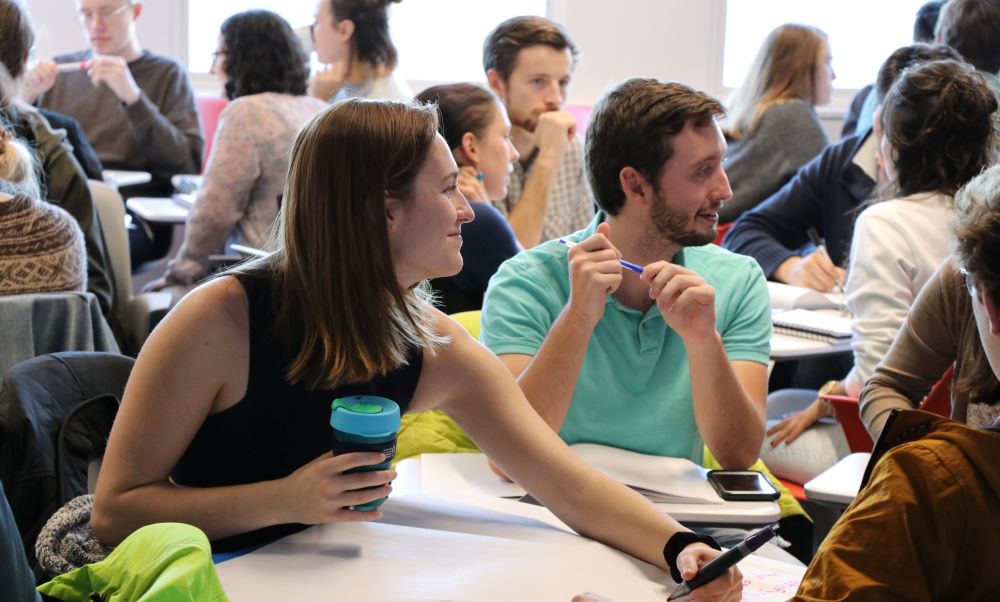
In this post, Michelle Brown, Head of Social Responsibility and Sustainability (SRS) Programmes and Deputy Director of SRS, describes how the Department for Social Responsibility and Sustainability works to align teaching and learning outcomes with both the university’s 2030 strategy and global sustainable development goals (SDGs)…
Our University’s vision is that “our graduates, and the knowledge we discover with our partners, make the world a better place”. Strategy 2030, the university’s strategy for the next decade, sets out commitments for: teaching and learning; research; people and social and civic responsibility.
The global Sustainable Development Goals (SDG) provide a lens from which to approach key social responsibility and sustainability (SRS) issues. In 2015, the University joined a global SDG Accord, which aims to inspire, celebrate and advance the critical role of education along with a commitment to embed the SDGs into our education, research, operations, and engagement.

Last year, we surveyed students and staff to find out more about what social responsibility and sustainability (SRS) issues and actions matter most to them. Embedding SRS into courses was one of the issues highlighted. This was ranked 9 out of 10 in a list of issues by students (and staff) who participated in the survey with more prioritising action on issues such as energy, waste, responsible investment and purchasing. See the headlines here.
The SRS Survey also asked students about their opportunities to learn about social responsibility and sustainability in academic programmes. 45% of those who participated in the survey responded that issues relating to SRS featured in their programme. 39% responded that they felt they had enough opportunities to learn about SRS in their programmes. However, it is worth noting that given the voluntary nature of the survey, it is likely that those who responded were more interested in sustainability already.
In 2019, we initiated a small collaborative project to learn more about how the Sustainable Development Goals (SDGs) come to life in University programmes and in different schools. Guided by a steering group of academics and supported by an amazing PhD intern, the project aimed to track the inclusion of the SDGs in the curriculum to: develop and distribute a reproducible mapping survey, establish groundwork and a baseline for future monitoring, and support learning and teaching related to the SDGs. The project shifted from an initial idea of looking at all schools and colleges in the University to focusing on one school in depth and testing the approach. We are very grateful for the Business School for offering to be a test bed for the project. The project applied and adapted a methodology developed by staff and students at the University of Toronto.

The analysis and full report is currently being written up. The steering group will be looking at that and then sharing some lessons learned more widely and undertaking the mapping with other schools.
One lesson learned already is that by shining the light on what is already happening with regards to the integration of the SDGs it can also encourage others to think about this in their courses. Alongside the SDG mapping, another piece of work has been looking to understand the drivers and barriers for integrating social responsibility and sustainability issues (SRS) in learning and leaching. A scoping study has been carried out to review current professional development and practices at other universities.
Our department is working on a range of projects that contribute to the student experience and provide opportunities for students to learn about sustainability in addition to their formal studies. These projects include the SRS Student Pathways and the Sustainability Champions Network.
Globally, attention is now focused on the Covid 19 emergency. In addition to impacts on lives and livelihoods there are the impacts on learning. This disaster can remind us of our interconnectedness and as Christina Figures (former Executive Secretary of the United Nations Framework Convention on Climate Change (UNFCCC)) recently noted ‘we are only as safe as the most vulnerable among us’.
The SDGs highlight the interconnectedness of the critical issues affecting our planet. Linked to our vision of our graduates making the world a better place, opportunities to explore what it means to be a global citizen and issues around sustainability are critical. As things reset in the months ahead, I hope students in any discipline will have more opportunities to critically examine issues related to the Social Development Goals, for sustainability and social and civic responsibility.
You can learn more about our progress on social responsibility and sustainability issues including our response to the climate emergency and embedding the SDGs here.
For more information on the SRS Department, visit the website.


